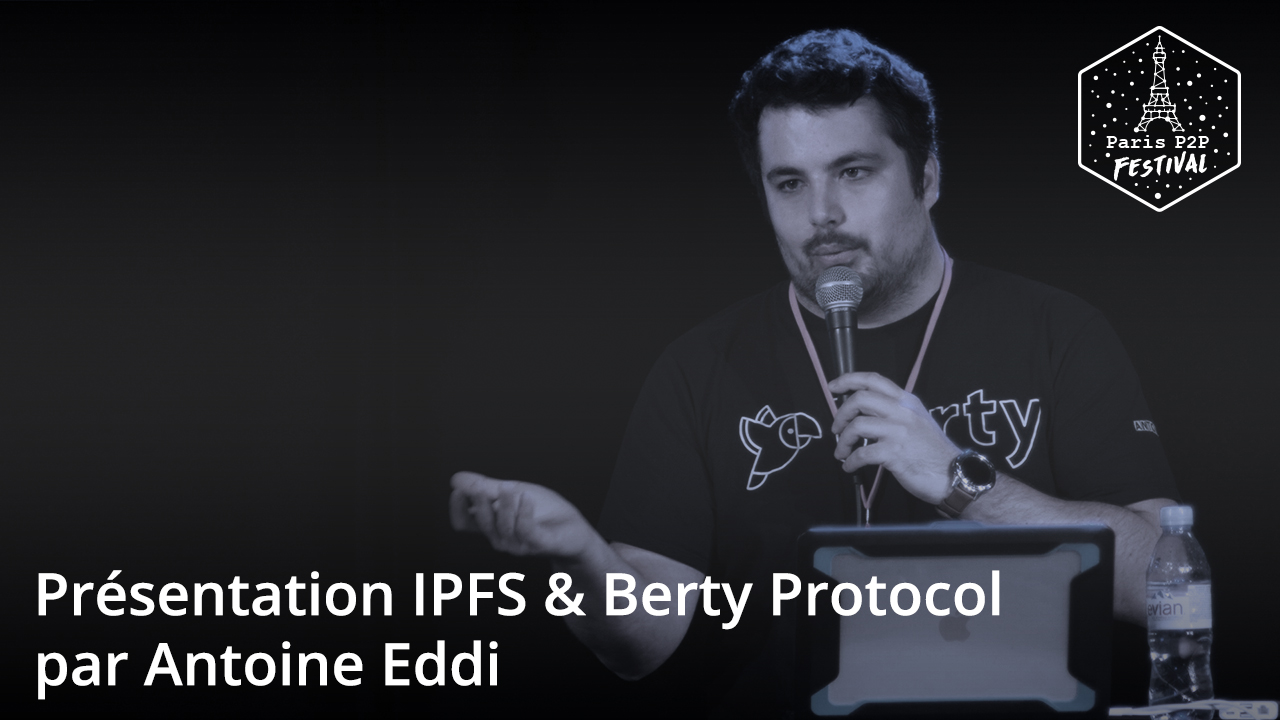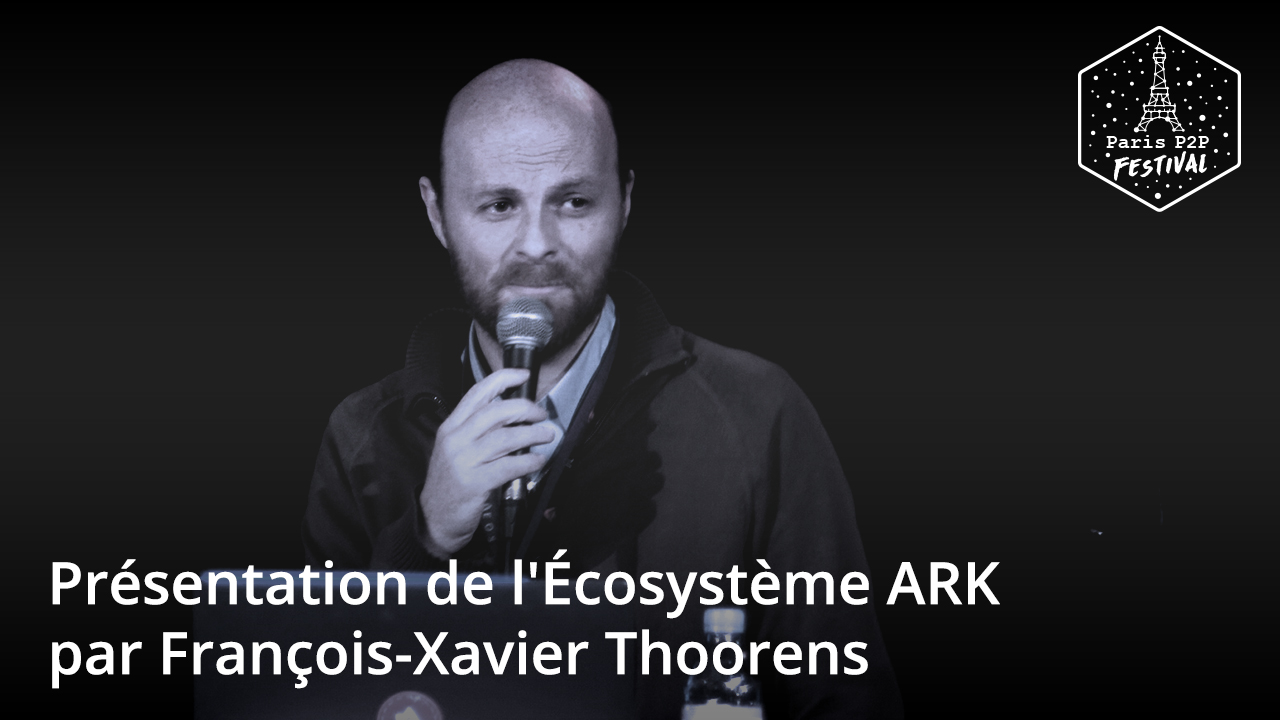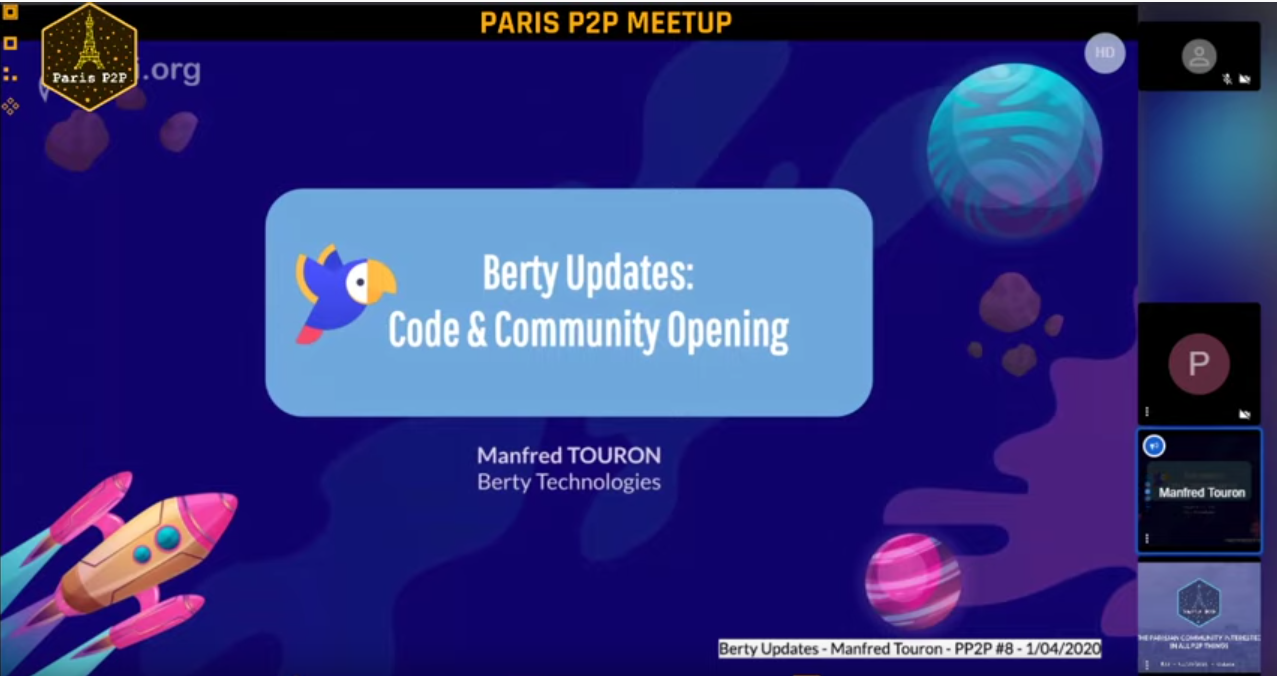Talks
April 27, 2022
22H00 - 22H30
EN
Ground Control
Olivier Bégassat

ZK-EVM, overview and progress
What are ZK-EVMs? Zero-knowledge & EVM: What is the state of play in the ecosystem? What progress has been made recently? What are the perspectives on these protocols for the future of privacy?
January 11, 2020
15H00 - 19H00
EN
Ground Control
Fasto

P2P Painting - Experiment Peer-painting with friends
Participative & peer-painting with Fasto - children and adults equally welcomed!
April 30, 2022
19H00 - 19H30
EN
Ground Control
Manfred Touron

Berty Protocol & Berty’s non-profit org - Current state & Berty’s vision of the Commons for Privacy
Manfred Touron is the founder of Berty Technologies, an NGO that develops the open source protocol Berty. Through the Berty project, it is not only about a messaging application, but about a set of challenges that humanity is facing. How to develop common tools to defend privacy, and resistance to censorship? A vision of the future for Berty and its open ecosystem.
January 11, 2020
13H42 - 01H00
EN
Ground Control
Arthur Bard

France Barter
France Barter: a marketplace between businesses. Purchase without money within a community of peer businesses.
January 11, 2020
15H00 - 16H00
EN
Ground Control
Antoine Eddi
https://youtu.be/jtAtIsyUn0A

Introduction to IPFS and Berty Protocol, by Antoine Eddi
What is IPFS? How does it work? How can it be used? What is Berty and how did they use IPFS in their project? Lessons learned by Antoine Eddi
April 28, 2022
20H30 - 21H00
EN
Ground Control
Alexandre Vinot

Earn Bitcoin while heating your home
Why is it important to continue decentralizing the security of Bitcoin? How can we enable the general public to participate in the security of the network, while creating new incentives to do so?
April 28, 2022
21H00 - 21H45
EN
Ground Control
Gilles Cadignan

Bitcoin Data Security
Bitcoin is a clock. Simple, robust, and secure, the Bitcoin protocol is used in many different contexts to time-stamp documents. Why is Bitcoin a security tool for certain data?
January 12, 2020
17H30 - 18H45
EN
Ground Control
N/A

Protocole - A documentary about Bitcoin & Cryptocurrencies
Protocole is plugged to the « cryptosphere », where one can meet users and supporters of Bitcoin and other cryptocurrencies, as well as entrepreneurs and researchers. Giving them a voice makes it obvious that Bitcoin as a way of challenging monetary institutions is actually part of larger trend of the society as a whole. Cryptocurrency are not just a new "asset class", but complex and far-reaching social phenomenon.
January 9, 2020
18H30 - 19H00
EN
Ground Control
FX Thoorens
https://youtu.be/eOafgOyS3UQ

Presentation of the ARK Ecosystem and its most recent developments, by François-Xavier Thoorens
ARK Ecosystem is the multistakeholder co-op that created the ARK blockchain. François-Xavier will present both the organization of the co-op and the DPoS-based protocol, including its latest features.
August 7, 2019
21H00 - 21H30
EN
Ground Control
Manfred Touron

History and current state of P2P
Slides: here
January 9, 2020
23H00 - 00H30
EN
Ground Control
N/A

DJ DITLEF (Hip-hop/Soul/Funk)
April 29, 2022
22H30 - 23H00
EN
Ground Control
Vladimir Oustinov

Q&A
Open question and answer, with the 3 founders of these Web3 companies, and on their strategic approaches to the decentralization of organizations.
April 27, 2022
20H30 - 20H45
EN
Ground Control
Manfred Touron, Loïc Titren & zôÖma

Hello, world!
Hello world!
January 10, 2020
15H00 - 18H00
EN
Ground Control
Alice

Workshop on Future SOLID Specifications
Workshop on the future of SOLID specifications. In French. Offered by Alice and the Digital Commons Consortium. SIGN UP
April 30, 2022
17H15 - 17H45
EN
Ground Control
Marten Seeman & Max Inden

Hole punching with libp2p
We’ll take a closer look at the recently added decentralized hole punching feature, allowing NAT and firewall traversal without the need for any central coordination servers (STUN and TURN).
April 30, 2022
15H40 - 16H10
EN
Ground Control
N/A

QUIC Deep Dive + Developments at the IETF (MASQUE, WebTransport, etc.)
QUIC is an always-secure, stream multiplexed transport protocol built on top of UDP that promises significant performance improvements.
April 30, 2022
17H00 - 19H00
EN
Ground Control
N/A

Aleph.im Virtual Machines Workshop - resilient and decentralized hosting
Learn how to host run your backend on the decentralized Aleph.im network and access trusted off-chain data. Aleph.im is a decentralized storage and execution network that can be used instead of traditional cloud providers such as AWS our Google Cloud. In this workshop, you will build a Python web application, host it on Aleph.im Linux Virtual Machines and use it to display signed off-chain data stored on the Aleph.im network. Requirements: - Beginner/intermediate knowledge of Python programming - Software: Docker
April 29, 2022
00H00 - 01H30
EN
Ground Control
Aurelio LostGroove

DJ Set - Aurelio LostGroove
"Soulful Music for Smiling People" Funk/Soul/Disco/Boogie/House/Jazz/Hip-Hop/Afro/Breaks/Beats
January 12, 2020
15H00 - 16H30
EN
Ground Control
Alexandre Doussot

How to Develop Smart Contracts with Tezos
Introduction to Michelson and to higher level language Ligo, used in an example of a voting app, that we will study together. Bring your laptop with Linux or OSX, Docker and Python 3. Useful links: https://ligolang.org/ https://gitlab.com/kinokasai/proposals-vote/blob/abate-cleanup/src/contracts/mono_vote.ligo https://gitlab.com/kinokasai/proposals-vote SIGN UP
January 11, 2020
18H30 - 19H30
EN
Ground Control
Friedger Müffke

Decentralized Login and Storage with Blockstack
In this session, you will learn how to add authentication to web apps that does not require any servers. It will be shown how user-owned storage can be used to exchange and verify data between users, in particular group membership and payment receipts. React.js and Blockstack.js will be used in this session. SIGN UP
January 10, 2020
15H00 - 23H00
EN
Ground Control
Mamie Crypto

Introduction to blockchains and cryptocurrencies by the @LesHackeuses collective
@LesHackeuses and friends support women in their effort to play a bigger part within the blockchain ecosystem.
January 11, 2020
15H00 - 18H00
EN
Ground Control
Nelson Melina & Manel Ruiz

Workshop on Aeternity and its functional programming language, Sophia
Aeternity has developed a functional programing language for smart contracts called Sophia, a "dialect" of Reason ML. To help developers get into It, we have created a remunerated online course($75 in AE). Participants to the worshop will receive a link to get access to It. At the end of the course there is a "Challenge": students have to sucessfully modify a voting Daepp. SIGN UP
July 1, 2020
21H00 - 21H30
EN
Internet
Sébastien Rannou

Geo Backtracker by Sébastien Rannou
How to correlate GPS positions at scale (Covid)
April 1, 2020
21H30 - 21H45
EN
Internet
Manfred Touron
https://youtu.be/YZJ5NXs8MUM

Last news from the Berty project + Code & Community openings
April 29, 2022
21H45 - 22H00
EN
Ground Control
Louis Giraux

Twoplus Presentation
TwoPlus defines itself as a mental fitness club and DAO (Decentralized Autonomous Organization) design. But what is it?
January 11, 2020
17H00 - 18H30
EN
Ground Control
Brian O'Hagan

Learn how to interact with smart-contracts on Ethereum
Level: beginner and intermediate. No technical knowledge is required, this workshop is intended for newcomers who wish to discover and interact with the Ethereum ecosystem. We will give you the best practices and everything you need to get off to a good start in this high-potential ecosystem. What to bring : - A laptop, with a web browser (Google Chrome or Brave required) - Writing materials (pen & paper) In this introductory workshop you will : - A quick introduction on Ethereum will be given by the speaker. - You will create an Ethereum portfolio. - We will supply them and analyse what happens when a transaction takes place. - We will interact with several smart-contracts to perform various transactions. - We will create a personalized name for your Ethereum account. - We will teach you how to interact with real Dapps (decentralized applications). - A panorama of interesting Dapps will be presented to you. SIGN UP
April 29, 2022
19H00 - 21H00
EN
Ground Control
PoC Innovation

Use Merkle Tree for Smart Contract Auth
In this workshop, we will see how to implement Merkle Proof by deploying our Solidity contracts and verify their validity with Merkle Proof Typescript without having all the chain history. Merkle Proofs help us save gas and memory during our smart contract execution
January 10, 2020
15H00 - 01H00
EN
Ground Control
N/A

Hackathon & Workshops
The hackzone is opened to everyone for peer-coding, offer a workshop, share ideas...
January 9, 2020
19H00 - 23H00
EN
Ground Control
Fasto

P2P Painting - Experiment Peer-painting with friends
Participative & peer-painting with Fasto - children and adults equally welcomed!
September 4, 2019
21H00 - 21H15
EN
Ground Control
Fred Zicmama

P2P VS Lords of the Ring
From single computers to ONE. A quest for the precious.